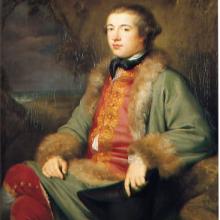
Scotland on Sunday (1 May) carried a fascinating article about the recent discovery in Oxford of James Boswell's lost work-in-progress: a dictionary of Scottish words.
Boswell (1740–95) – a charming blend of character flaws: Edinburgh resident, lawyer, neurotic, sexual desperado and wordsmith – commenced the work in the 1760s and gained encouragement for it from the lexicographer Dr Samuel Johnson.
The manuscript went missing after Boswell's death, but was recently found by scholar Susan Rennie in the Bodlean Library among another writer's papers.
We asked Broughton's Anne Seaton – herself a distinguished lexicographer – for her reaction to the news.
'I know Susan well as a former Chambers and freelance colleague,' she told us, 'and knew about her work on Jamieson, but hadn't heard about this initial work on Boswell's projected Scots dictionary being found. What a discovery!
'The reference to Johnson's encouragement is in 1769 in Boswell's Life of Johnson (when Johnson was aged 60, Boswell 29):
On Thursday, October 19, I passed the evening with him at his house. He advised me to complete a Dictionary of words peculiar to Scotland, of which I shewed him a specimen. 'Sir, (said he,) Ray has made a collection of north-country words. By collecting those of your country, you will do a useful thing towards the history of the language.' He bade me also go on with collections which I was making upon the antiquities of Scotland. 'Make a large book; a folio.'
BOSWELL. 'But of what use will it be, Sir?'
JOHNSON. 'Never mind the use; do it.'
'Never mind the use, do it' has been a guiding principle of optimistic authors and publishers ever since.